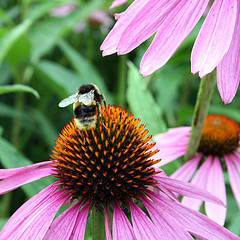
A recent HRWC Green Infrastructure Workshop has spurred a Northfield Township resident to promote native landscapes to help our struggling bee populations. Cecilia Infante has begun a campaign to increase backyard habitat for honey bees and other pollinators. “Anyone can participate by planting pollinator friendly plants in gardens or just window boxes (you don’t even need a yard). We also want to educate residents and business owners about this environmental emergency, and encourage them to make small changes that have a big impact on the environment, such as considering alternatives to pesticides (especially neonicotinoids) and to the manicured lawns that are “food deserts” for honey bees and monarchs. Landscapes of native flowers and grasses would provide forage for pollinators while requiring far less maintenance and cost than a green lawn.”
On May 19, the White House announced its National Strategy to Promote the Health of Honey Bees and Other Pollinators (Pollinator Health Strategy 2015 (pdf)). Michigan is one of the five states slated to receive a portion of the $11 million designated to support this national cause (USDA Provides $8 Million to Help Boost Declining Honey Bee Population). While the deadline to apply for the initial $3 million has passed, there are myriad other opportunities available for those interested in participating in the recovery of the honey bee and monarch populations through the USDA’s Natural Resource Conservation Service (NRCS) and the DNR’s Wildlife Habitat Development Efforts.
In addition to forming a network of residents creating habitats, green infrastructure and applying for conservation support, Cecilia’s group hopes Northfield Township residents will consider promoting Whitmore Lake as one of the first “Bee Cities” in Michigan (Ypsilanti is currently exploring this certification–see http://www.beecityusa.org/ ).
HRWC has long advocated for native landscapes, including installation of rain gardens as stormwater-control green infrastructure – rain gardens provide great habitat and refuge for pollinators of all kinds, including honey bees and they help protect water quality by infiltrating stormwater runoff.
Other resources:
DNR Guide to Backyard Wildlife Management
Michigan State University Extension
If you would like to learn more about enhancing habitat for pollinators, or want to connect with the newly-formed “MI Pollinator Project,” email Cecilia at writing4all@aol.com.



